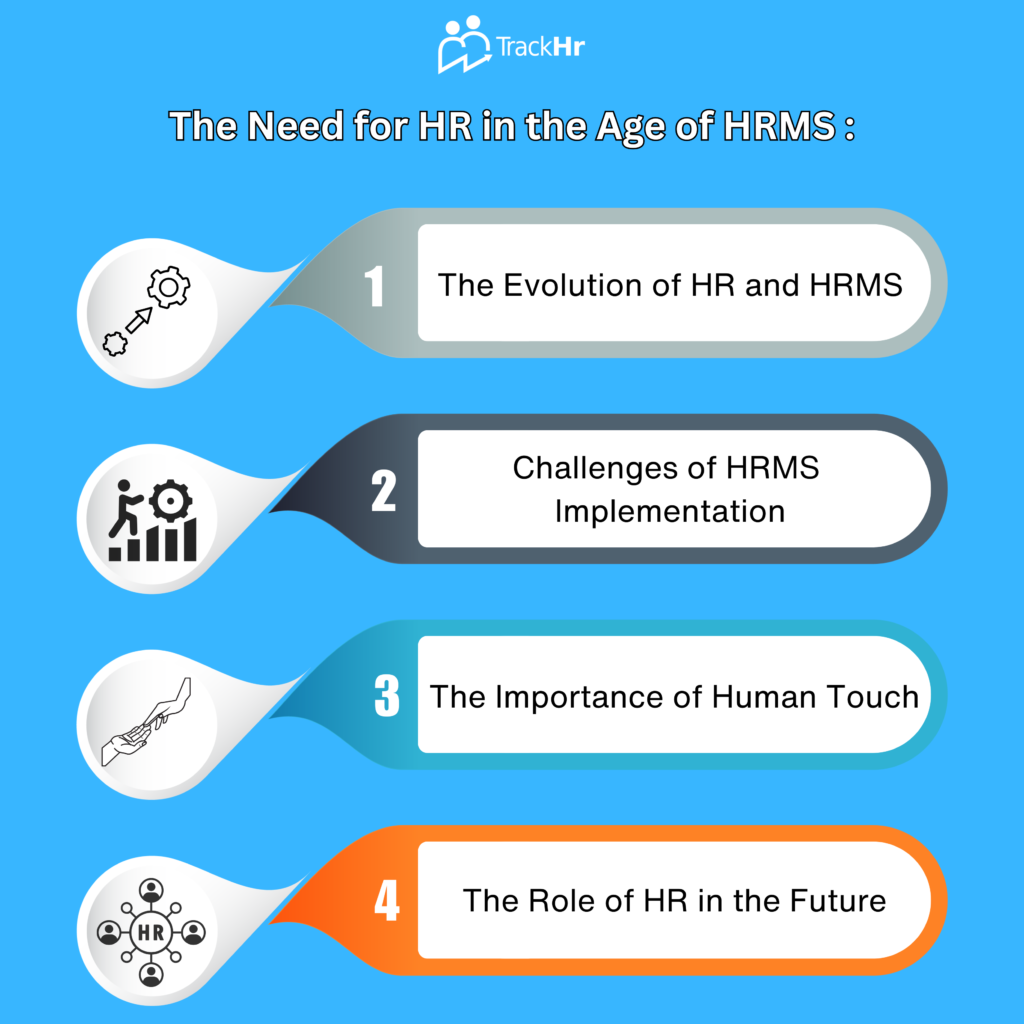Friday, 18 August 2023
The Need for HR in the Age of HRMS
Table of contents
- Introduction • The Evolution of HR and HRMS • Challenges of HRMS Implementation • The Importance of Human Touch • The Role of HR in the Future • Conclusion
Introduction
HR has been a vital function in any organization for decades, but with the evolution of HRMS, i.e. HR Management Systems, the role of Human Resources has been undergoing a significant shift. Gone are the days of paper-based filing and manual handling of employee data; we now have automated HR processes and detailed analytics. However, the implementation of HRMS comes with its own set of challenges, and it cannot replace human touch and emotional intelligence. So, let’s explore the reasons why HR is still a crucial function in the age of HRMS.

The Evolution of HR and HRMS
Introduction: Human Resource Management System (HRMS) has revolutionized the way businesses manage and monitor their human resource functions. However, despite the multiple benefits of HRMS implementation, organizations require HR professionals to handle tasks that demand a human touch. The Evolution of HR and HRMS: The Traditional Role of HR: HR was initially a paper-based function that involved tedious manual tasks such as maintaining attendance records, employee data, and compensation details. Despite the introduction of computers and digitalization of HR processes, managing this data remained a daunting task. The Emergence of HRMS: HRMS was a breakthrough solution that simplified HR processes. By integrating previously siloed functionalities such as payroll and recruitment onto a single platform, HR professionals could easily manage employee data and streamline their processes. Integration and Expansion of HR Functions: With the rapid integration of HRMS, routine HR tasks and processes were automated, allowing HR professionals to devote more time to strategic planning. HR has evolved to play a more strategic role in organizations and, as such, has assumed responsibility for critical areas such as employee productivity, engagement, and talent management. Despite the many benefits of HRMS implementation, organizations require HR professionals to handle tasks that demand a human touch. Therefore, we can conclude that HR will forever remain an essential element in the workplace.
Challenges of HRMS Implementation
The Need for HR in the Age of HRMS The Challenges of HRMS Implementation Implementing an HRMS can be a daunting task for any organization. It’s a significant change that affects the whole company. Therefore, it’s not surprising that there are a number of challenges that come with it. Resistance to Change Implementing an HRMS means changing the way people work, and people, by nature, don’t like change. There will always be employees who resist this change, even if it’s for the better. To deal with this, it is essential to communicate with them about why these changes are necessary, and how they can help improve operations. Lack of Employee Training Employees need to know how to use the HRMS system to make it effective. It is essential to provide them with enough training and guidance to ensure that they can utilize the system effectively. Data Security and Privacy Issues Implementing an HRMS means dealing with sensitive information like employee records, appraisal details, and salary information. Ensuring the safety and security of this data is of utmost importance. It’s crucial to have the right security protocols in place to avoid data breaches. While HRMS significantly simplifies and streamlines HR processes, it cannot replace human interaction. HRMS’s are merely tools in the hands of HR professionals. A balance of technology and human touch is essential for effective HR management.
The Importance of Human Touch
The recruitment and selection process isn’t the only thing that’s transforming HR departments. Human resources management systems (HRMS) have emerged as a new way of streamlining HR processes, and although there are still challenges associated with implementation, HRMS are here to stay. However, as much as HRMS can mechanize routine HR tasks, they are not a substitute for the human touch. Emotional intelligence, culture fit and employee engagement are crucial aspects of HR that cannot be fully automated. HRMS can help with talent management and hiring, but they cannot replace the judgment and intuition of a person who can utilize emotional intelligence to discern the best hires for the organization. Similarly, it’s important to keep cultural fit in mind when making those hires. A person might tick all the boxes on paper, but might not mesh well with the organization’s culture. No amount of data analysis can predict that. Employee engagement and well-being also require a human approach. HRMS can help with the distribution of employee surveys and other tools to gauge engagement, but they cannot hold empathetic conversations with employees or offer solutions to improve their well-being. In short, HRMS are great for some aspects of HR, but they cannot replace the human touch. HR departments must ensure that they maintain a balance between operations that can be streamlined with HRMS and other aspects that require human intervention.
The Role of HR in the Future
As we move forward into the age of automation, some argue that HR may become obsolete. But let’s remind ourselves that we’re talking about people here, not just numbers and data. Therefore, the importance of human touch in HR cannot be disregarded. Strategic Planning and Decision-Making is a vital aspect of HR, especially in the age of rapid technological advancement. HR plays a significant role in aligning the business goals with the workforce to achieve the organization’s objectives. Talent Management is another area where HR needs to focus on. The traditional methods of recruitment and retention will have to evolve to suit the changing needs and demands of the workforce. Hence, HR must drive employee advocacy and wellbeing initiatives to create a positive culture for employees. The role of HR is not just to carry out administrative tasks but also to bring a human element into the workplace. As AI and automation become prevalent, the importance of relationships and empathy in the workforce will only increase. Therefore, HR cannot be replaced by HRMS entirely. Instead, it has to evolve and embrace technology to enhance its value and stay relevant. After all, the future of work is human.
Conclusion
In summary, while HRMS is essential to streamline HR functions, it cannot replace the human touch. Emotional intelligence, culture fit, and employee engagement are critical elements that require a personal connection. HR still has a vital role in strategic planning, decision-making, talent management, and employee advocacy. Successful HRMS implementation is dependent on addressing challenges such as resistance to change, lack of employee training, and data security. The key takeaway is that organizations should strive to find a balance between technology-driven HRMS and a people-centric HR approach.
